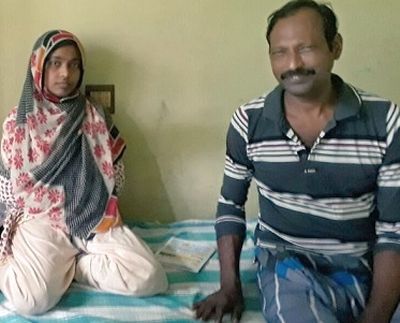'Mercifully, the Supreme Court is currently playing the role of the elderly wise to prevent wrong-doing,' says Amulya Ganguli.

Imagine there's no Supreme Court, to misquote the celebrated John Lennon song, imagine there's no heaven.
In such circumstances, the Akhila-Hadiyas of India will always remain in parental 'custody', a confinement of love and discipline in the eyes of their well-wishers.
The fact that they are adults and are, therefore, theoretically free to go about on their own will make no difference to the ideologues of the ruling dispensation in the absence of a judiciary to determine what is legally permissible and what is not.
So, the powers that be will put to effective use their vast publicity machinery to ensure that their views prevail in the social and even large sections of the mainstream media to the exclusion of those of its opponents, who will be derided as anti-national.
Even the National Investigating Agency may be persuaded with a nudge and a wink to take time off from cases pertaining to terrorism -- its real objective -- to probe the dubious connections of those living with their parents after being snatched away from their husbands.
Parents, and especially the father, will be projected as the 'natural' and virtually the only legitimate guardians of their children -- even those above the legal age of maturity -- whose word is inviolable because parental authority will be deemed to have the sanction of the traditional Hindu way of life.
This attitude can be seen in countless Hindi films where the father announces the engagement of his daughter to the son of a friend without telling her in advance, let alone asking her permission.
Moreover, the concept of adulthood at the age of 18 will be decried as a Western concept, which is at odds with the ideals of Sanatan Dharma (the eternal religion).
The prospective husband, of course, will not only be chosen by the parents, but he must be of the same religion as his would-be wife in a country sans law courts.
Any possibility of the two belonging to different faiths -- as in Hadiya's case -- will be dismissed out of hand.
In such an India, the charge of a marriage being the outcome of an instance of 'love jihad' will not only be an instrument for effecting the separation of a couple belonging to two different religions, but will also join cow vigilantism as a means of spreading the Hindutva ideology.
Incidentally, as there will be no legal system, there will not be any judicial directions to the state governments to restrain the vigilantes.
The outlawing of inter-faith weddings by executive diktat will be expected to ensure the ethnic purity of the Hindus.
Racial exclusivity is an article of faith with the fascists. It was strictly enforced in Nazi Germany to ensure that the Aryan blood of the Germans -- the Master Race -- was not contaminated by the Jews.
The same intense sectarianism also guides other racists like the anti-black Ku Klux Klan in the US and is generally associated with the anti-Muslim and anti-immigrant hyper-nationalists of Europe.
It is the growing manifestation of this virulent form of nationalism in India which has led to the characterisation of the government's critics as anti-national and even anti-Hindu.
Hadiya's case is an offshoot of this divisive outlook which has been gaining traction from the poisonous propaganda and diabolical acts of the Islamic militants.
Since fundamentalism of one kind feeds on the fundamentalism of another variety, they tend to borrow and imitate the worst aspects of each other's worldviews.
The Hadiya episode demonstrates one of these -- patriarchy and its offshoot, the subordination of women in the family and society where they have no voice.
To make matters worse, society does not always play a sobering, educative, role at a time when extremism, which is always the prerogative of a small, but vocal group, holds the upper hand.
Instead of the voice of the elders of a society showing the right path, they either remain silent or acquiesce in the acts of the aggressive minority.
Mercifully, the Supreme Court is currently playing the role of the elderly wise to prevent an egregious wrong-doing.
But we are considering a nightmare scenario where the court does not exist. To misquote Tagore this time, in that hell of unfreedom, let not my country awake.
Amulya Ganguli is a writer on current affairs.
IMAGE: Hadiya and her father K M Ashokan.










